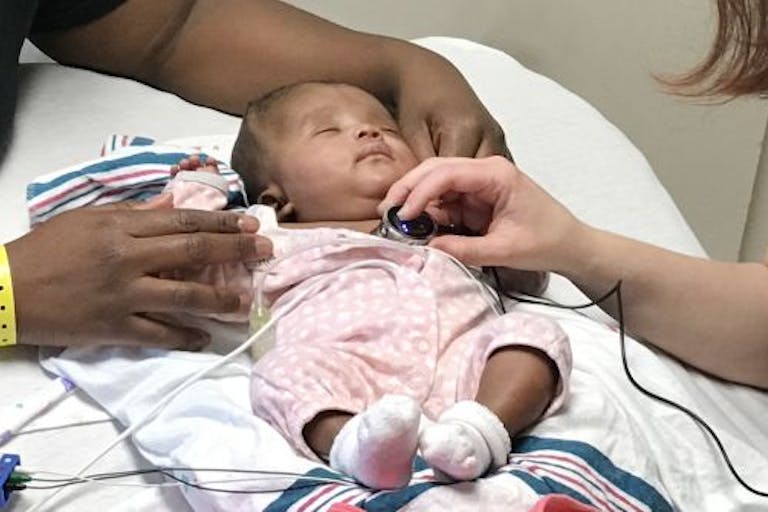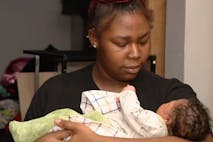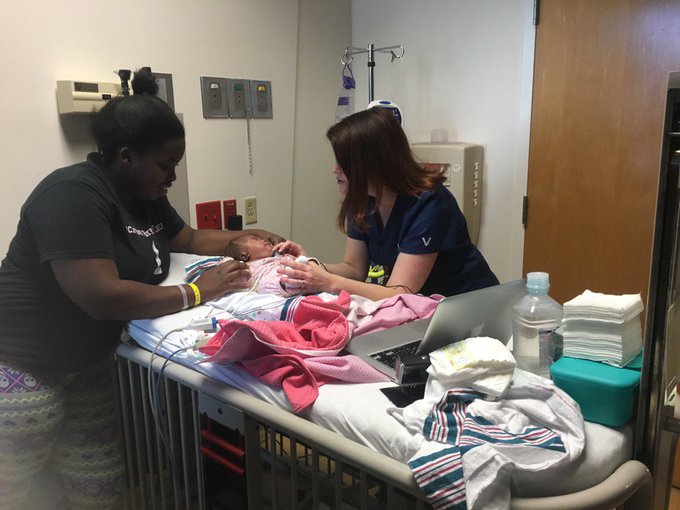The beautiful way music therapy is helping young kids at @WolfsonChildren @ActionNewsJax at 5:55

Premature babies soothed by songs created from their own heartbeats
Premature babies soothed by songs created from their own heartbeats
A premature birth can be stressful for everyone — for the baby, for his or her parents, and for the medical team tasked with providing care. But the staff at one children’s hospital is finding novel ways to help premature babies survive and thrive… and it gives them a lifelong souvenir, too.
Baby Hazel was born early, at just 27 weeks of pregnancy. After she was born, she and her mother, Tiffany Perry, were transferred from a hospital in Pensacola, Florida, to Wolfson Children’s Hospital in Jacksonville. When Hazel was born, she weighed just two pounds, and due to complications from her premature birth, doctors initially weren’t sure if she would survive. But now, four months later, Hazel is still here. And the staff at Wolfson Children’s came up with an incredible way to help Hazel and other babies like her.
Julie Avirett is a board-certified music therapist who uses a digital stethoscope, purchased through a $500 grant, to play music for babies like Baby Hazel. And what makes this music so special is that Avirett creates it from their own heartbeats. “Sweet little Hazel, came into this world early, weighing just shy of two pounds, sweet little miracle, sweet little miracle,” Avirett sang to Hazel as she played her guitar.
Avirett used the digital stethoscope to record Hazel’s heartbeat, and then, right at Hazel’s bedside, mixed it with the track she wrote for her using a program called GarageBand. “It’s not only a way for me to help these children, but to capture all the things they have overcome,” Avirett said. And it was a touching moment for Perry, too. “She is my little miracle with all the stuff she’s been through,” she said. “I’m very thankful for this. I’ll play it for her when she gets older and tell her where it came from.”
At Wolfson Children’s, the medical team makes referrals for patients to receive the special music therapy, and each session is tailored to each patient’s individual needs. The music therapy can help with patient heart rates, lowering blood pressure, and pain management, as well as easing anxiety and helping patients cope. “This kind of technology is a meaningful intervention for our patients and families,” Family Support Services Manager Pat Kirkland said. “It allows for self-expression because kids can create a song and have their heartbeat blended with it. Or we can use it to record a parent’s heartbeat to provide comfort to an infant.”
“When a child has a life-limiting illness, the heartbeat recording can provide a legacy to the family,” she added.
READ: These unsung heroes of the NICU help premature babies just by holding them
Article continues below
Dear Reader,
Have you ever wanted to share the miracle of human development with little ones? Live Action is proud to present the "Baby Olivia" board book, which presents the content of Live Action's "Baby Olivia" fetal development video in a fun, new format. It's perfect for helping little minds understand the complex and beautiful process of human development in the womb.
Receive our brand new Baby Olivia board book when you give a one-time gift of $30 or more (or begin a new monthly gift of $15 or more).
Right now, 24 weeks is often considered to be when preborn babies are viable — meaning they can survive outside of the womb. Some babies survive being born much younger, and are able to thrive, but even after 24 weeks, there are obstacles babies like Hazel must overcome. A preborn baby’s lungs don’t reach maturity until approximately 36 weeks, for example, so if a doctor knows that premature birth is impending, a shot of steroids is often given to help the preborn baby’s lungs develop more quickly.
Premature babies also are at increased risk for problems like jaundice, infection, intraventricular hemorrhage (bleeding in the brain), sepsis, and more, which is why babies like Hazel need such intensive, specialized care.
Premature babies may need extra care when born so young, but their development from conception happens rapidly. From the moment of conception, the preborn baby has his or her own unique DNA; the baby’s heart may, according to research, begin beating just 16 days after conception. By just six weeks, the preborn baby can respond to touch, and brain waves can be detected.
Babies begin to yawn and suck their thumbs at nine weeks, and have fingerprints. All of this incredible development happens in the first trimester alone.

Medical advances have allowed premature babies to survive at younger and younger ages. Amillia Taylor and Frieda Mangold both survived after being born at just 21 weeks gestation. More and more babies are surviving at 22 weeks. And indeed, emerging research is showing that premature babies who receive active care are significantly more likely to survive. Yet preborn babies at these same ages are targeted for abortion, despite the proof of their humanity, and the fact that they are increasingly able to survive outside of the womb.
Babies like Hazel show that miracles exist, and that life is precious — all life, no matter what.
Live Action News is pro-life news and commentary from a pro-life perspective.
Contact editor@liveaction.org for questions, corrections, or if you are seeking permission to reprint any Live Action News content.
Guest Articles: To submit a guest article to Live Action News, email editor@liveaction.org with an attached Word document of 800-1000 words. Please also attach any photos relevant to your submission if applicable. If your submission is accepted for publication, you will be notified within three weeks. Guest articles are not compensated (see our Open License Agreement). Thank you for your interest in Live Action News!
Read Next

Christian college allows pro-life club after resolving 'misunderstanding'
Bridget Sielicki
·More In Human Interest

Human Interest
Pro-life nuns send annual Christmas cards to abortion businesses across the US
Nancy Flanders
·
Human Interest
Twin born at 23 weeks fought to survive after brother's death
Nancy Flanders
·
Human Interest
Police say man tried to flush baby after woman gave birth in toilet
Nancy Flanders
·
Pop Culture
NFL superstar Jason Kelce and wife Kylie open up about miscarriage
Cassy Cooke
·
Human Interest
TEARJERKER: Grandmother's beautiful reaction to scared teen's shock delivery
Cassy Cooke
·More From Cassy Cooke

Analysis
Woman intentionally hit pro-life activist with her SUV at Planned Parenthood
Cassy Cooke
·
International
Woman recounts grandmother's euthanasia: 'She thought she was a burden'
Cassy Cooke
·
International
Leaked documents suggest UK Labour Party is source of assisted suicide bill
Cassy Cooke
·
Politics
Court again rewrites Missouri ballot question to repeal state 'right' to abortion
Cassy Cooke
·
Pop Culture
NFL superstar Jason Kelce and wife Kylie open up about miscarriage
Cassy Cooke
·